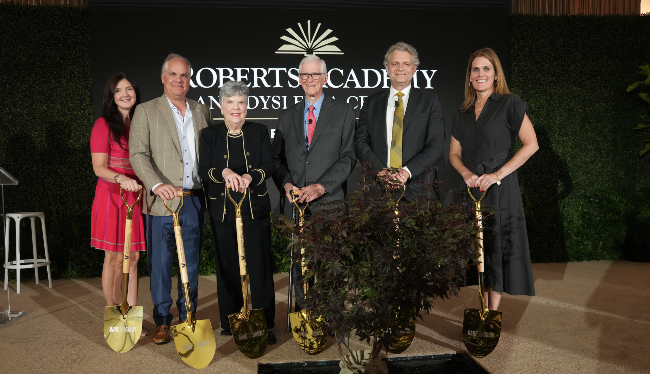Beginning in fall 2024, graduate and professional degree-seeking students at Vanderbilt University can enroll in certificate programs at Peabody College of education and human development enroute to earning their degrees. Whether students are just entering the workforce or are seasoned professionals, the new certificate programs in several fields will provide graduates a competitive edge to respond to urgent and emerging needs in education and human development.
Five new certificates in emerging learning technologies and AI, learning analytics, dyslexia studies, pediatric psychosocial care and early childhood policy will constitute the initial set of certificate offerings.
“These certificate programs reflect the breadth and depth of expertise among Peabody faculty in some of the most critical and emerging fields in education and human development. Graduates of the programs will join the workforce highly skilled and knowledgeable, ready to make an immediate and meaningful impact in their chosen professions,” said Catherine Gavin Loss, senior associate dean for academic affairs and professional education.
Emerging Learning Technologies and AI
The Emerging Learning Technologies and AI certificate is for students interested in how technology could be designed differently to support learning in a variety of contexts. Students will combine deep attention to how people think and learn in real-world settings with skill in leveraging the capabilities of emerging technologies, such as artificial intelligence, mixed reality, and data analytics, to design for impactful change.
“The goal is to help develop the future of new learning technologies and prepare students to participate in an ever-changing technological world. Many companies are developing new technologies and uses for them, so being well versed in what these technologies look like now and in the future is a very marketable skill,” said certificate director Alyssa Wise, professor of technology and education and director of LIVE (the Learning Incubator: A Vanderbilt Endeavor), a campus-wide initiative to reimagine and re-engineer technology’s role in teaching and learning.
Learning Analytics
The Learning Analytics certificate is for students interested in improving learning using data-driven approaches to analyze large datasets of learner data. Learning analytics can advance educational systems through predictive modeling that delivers in-time information to improve interventions and teaching methodologies. This certificate will provide students with foundational learning analytic tools—such as data management, machine learning, text analytics, and data visualization—to address myriad issues related to education of typical and atypical learners in the areas of assessment, instruction, research, and policy. Students will learn how to apply learning analytics to the field of education intervention and policy.
“The certificate will supplement students’ experiences at Peabody by giving them the opportunity to learn more about large data frames, data analytics, and data mining. Students will graduate with a firm understanding of how data integrates in our daily lives,” said certificate director Scott Crossley, professor of special education.
Dyslexia Studies
The Dyslexia Studies certificate is for students interested in serving and supporting students with dyslexia, and similar learning disabilities, in education systems. Students will learn about the challenges students with dyslexia may encounter, engage in administration and interpretation of instructional literacy assessments, and prepare and implement evidence-based literacy interventions for students with or at risk for dyslexia and other reading disabilities in grades K-12. Certificate-seeking students also may implement evidence-based interventions for students served by the new Roberts Academy and Dyslexia Center opening at Peabody College in fall 2024.
“The certificate would be particularly helpful to anybody who is currently working or plans to work in schools or clinic settings that serve school-aged children. The knowledge from the certificate would allow graduates to work with these populations in a much more effective way, as well as be more marketable for jobs within their field,” said certificate director Jeanne Wanzek, Currey-Ingram Chair and professor of special education.
Pediatric Psychosocial Care
The Pediatric Psychosocial Care certificate is for professional students interested in developing skills relevant to the psychosocial needs of children and families facing healthcare challenges and foundational knowledge regarding the child life profession. Preparing future healthcare, school-based, and youth-serving professionals with a unique set of research and practice skills to understand and respond to the psychosocial needs of pediatric patients and their families can lead to more positive healthcare encounters and improved behavioral, psychological, and academic outcomes for the most vulnerable children and youth.
“Pediatric patients are present in various youth-serving organizations alongside families and peers. Through this certificate, we will be able to prepare future youth-serving professionals with a skill set that will help facilitate the success of pediatric patients outside of the hospital,” said certificate director Vicki Harris, associate professor of the practice of psychology and human development.
Early Childhood Policy
The Early Childhood Policy certificate is for students interested in working in early childhood policy arenas, such as government agencies, advocacy organizations, and program development and/or evaluation.
“There are several reasons why a student may want to pursue this certificate. Early childhood policy lays the foundation for several other different types of policy. It contains a combination of broad-based economic and family supports such as Medicaid expansion, paid family leave, earned income tax-credits, and other targeted interventions,” said Cynthia Osborne, professor of early childhood education and policy and executive director of the Prenatal-to-3 Policy Impact Center.
The new certificates are only available to Vanderbilt students enrolled in programs resulting in a master’s or doctoral degree, using a combination of elective or required courses, with the approval of their degree program and the certificate director. Current or prospective graduate and professional students who may have an interest in these certificates should visit their respective web pages to learn more and obtain further contact information. An introductory video and an interest form are available here.

